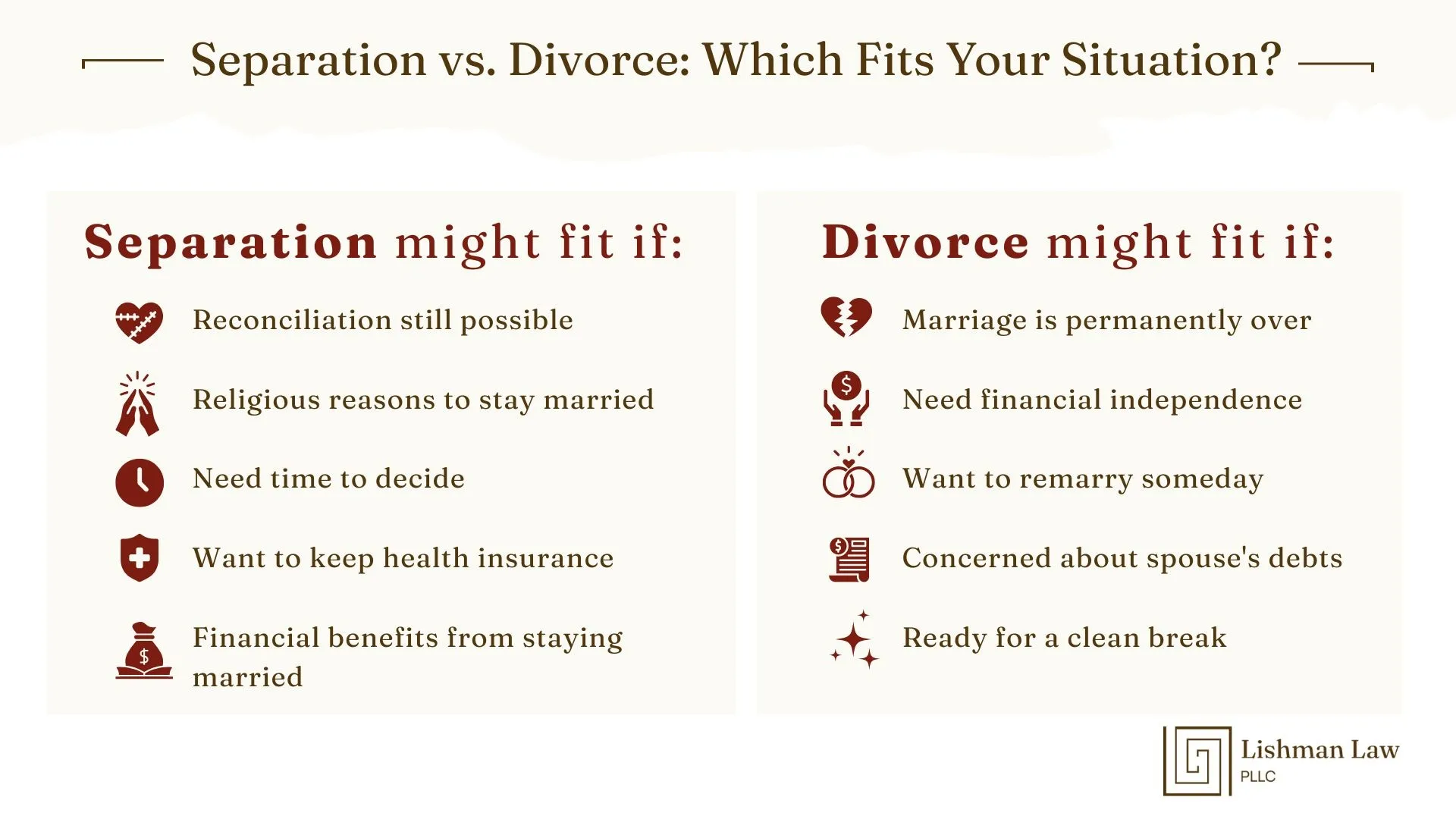Many Texas couples reach a point where living together is no longer working, but divorce feels too final, too costly, or premature. The question then becomes: Can you legally separate instead of divorcing, and what does that mean for your family and finances?
Texas law doesn't recognize legal separation, which leaves many people confused about their options. An experienced San Antonio divorce lawyer can help you understand and consider alternatives that protect your rights, your children, and your financial future without forcing you into a rushed decision.
What Is Legal Separation, and Why Doesn't Texas Recognize It?

Legal separation exists in some states, like California and New York, as a formal status allowing couples to remain married but live apart, with court-approved terms covering property, spousal support, and child custody. Texas doesn't have this option on the books, which surprises many people who assume that it's available everywhere.
This doesn't mean Texas couples can't separate or create agreements — it just means there's no specific legal status, and no filing, procedure, or court orders for legal separation available in the Lone Star State.
Texas operates on a binary principle: You're either legally married or divorced. Couples who separate without filing for divorce remain wholly intertwined under the legal definition of marriage, regardless of how long they've lived apart. There are other legal tools that can accomplish similar goals for couples who want to remain married while living separately.
Just because legal separation isn’t on the table in Texas doesn’t mean you’re without options. Several legal tools can provide similar protections while you decide whether divorce is warranted.
Separation vs. Divorce in Texas

Divorce ends a marriage permanently through a court order, while separation means living apart while still legally married. The two paths have very different legal consequences in Texas, especially when it comes to property, debts, and parental rights.
Divorce
- Ends the marriage legally and permanently.
- Divides all community property and debts through property division.
- Establishes formal child custody, visitation, and child support orders.
- Allows both parties to remarry.
- Requires court involvement and divorce proceedings.
Separation (Without Divorce)
- Marriage remains legally intact.
- Community property rules still apply to assets and debts.
- No formal custody or support orders (unless filed separately).
- Neither party can remarry.
- Can be done informally with private separation agreements.
Separation can be a first step or a long-term arrangement, depending on the couple's goals. It doesn't automatically protect either spouse from financial liability for the other's actions. Some couples choose this path for religious or cultural reasons, financial benefits like continued eligibility for health insurance, or because they're not emotionally ready to end the marriage.
Separation keeps your marriage intact in the eyes of the law, which means ongoing financial and legal ties. Divorce severs those ties, offering both parties a clean break and the ability to move forward independently.
What Happens If You're Not Divorced but Living Apart in Texas?

Living apart without filing for divorce is common, but many couples don't realize the potential legal consequences. In Texas, you're still married in every legal sense, which directly affects your property, debts, insurance, and even taxes.
Living separately without formally dissolving the marriage comes with several notable legal implications:
Community Property Still Applies
Even if you live in different homes, any income you earn or debts you take on during the separation are still considered community. That means your spouse could still have a legal claim to assets you acquire, and you could be held responsible for debts your spouse creates, and vice versa.
No Enforceable Child Support or Custody

Married parents living apart often come to informal agreements for a visitation schedule and financial support. An informal agreement between parents (even if written down, signed, and notarized) does not create enforceable rights or obligations. Without a court order, a parent could cut off financial support or take the children and keep them from the other parent.
Health Insurance and Benefits May Continue
One reason some couples delay divorce is to maintain access to employer-provided health insurance or military benefits. Separation without divorce allows the dependent spouse to stay covered, which can be a significant financial benefit and peace of mind.
Important note: If you're hoping to keep health insurance benefits or coverage, confirm with the provider that it will continue during separation. Some policies have specific rules about when coverage ends.
Tax Filing Status Remains the Same
For IRS purposes, you're still married if you haven't finalized your divorce by December 31 of the tax year. This can be a good thing or a bad thing, depending on your income and tax strategy.
Living apart without taking formal legal action leaves many issues unresolved and can create financial risks that you might not anticipate. Taking steps to formalize your arrangement through legal agreements or court orders can provide protection and clarity while you figure out your next steps.
Alternatives to Separation in Texas
Although Texas doesn't recognize legal separation, couples who want to live apart while staying married can make use of several other legal tools. Each serves a different purpose based on your situation and what you hope to accomplish.
Separation Agreement
A separation agreement is a private contract between spouses that outlines how they’ll handle finances, property, debts, and sometimes children while living apart. It isn’t filed with the court, but it can be legally binding if drafted correctly. This type of agreement can provide structure for a trial separation or longer-term arrangement.
A separation agreement covers the division of bills, who stays in the family home, how bank accounts are managed, and whether either spouse pays temporary financial support, among other considerations.
Texas courts may enforce these agreements, but they're not guaranteed to hold up if challenged. Having an experienced family law attorney draft the agreement increases the chance that it will be honored.
Partition and Exchange Agreement
This is a formal agreement that allows you to divide property and debts while you're still married. A partition and exchange agreement converts community property into separate property, giving each spouse clear ownership of specific assets. This can effectively stop the accrual of marital property and change the characterization of future earnings.
Important note: Once executed, partition agreements are generally difficult to undo, so you should only enter into one after careful consideration and with legal guidance.
Post-Marital Agreement

Similar to a prenuptial agreement but created after marriage, a post-marital agreement can establish property rights and clarify financial responsibilities during separation. It can also protect assets in the event that you eventually divorce.
Temporary Orders
If you file for divorce but aren't ready to finalize it, you can request temporary orders from the court. These orders may establish custody, visitation, child support, and exclusive use of the home while the divorce is pending. Temporary orders provide immediate, court-enforceable relief during separation.
Suit Affecting the Parent-Child Relationship (SAPCR)
If you have children and need formal custody or support orders but don't want to file for divorce yet, you can file a SAPCR. This creates a legally enforceable order for conservatorship, visitation, and child support without ending the marriage. A suit affecting the parent-child relationship allows you to establish custody while remaining legally married.
Protective Order
If you're separating due to domestic violence or family violence concerns, a protective order can legally prohibit your spouse from contacting you or coming near you and your children. This is a binding legal action that doesn't require filing for divorce and provides immediate legal protections. A protective order can also include terms for custody of children in certain cases.
Each of these tools serves a specific purpose and offers different levels of legal protection. Consulting an attorney will help you choose the right option based on your goals, whether that's protecting assets, securing custody, or buying time to decide about divorce.
Risks of Staying Married but Living Apart

Separating without formally ending a marriage might feel like a simple solution, but it comes with real risks. From financial liability to uncertainty regarding custody, staying legally married while living apart can create problems down the road.
Here are some of the primary risks of remaining married while separated:
Ongoing Liability for Debts
As long as you're married, you might be held responsible for any debts your spouse incurs, even if you didn't know about them. Community property laws in Texas mean creditors can go after marital assets to satisfy one spouse's debts.
No Clear Rules for Children
Informal custody arrangements can fall apart quickly if one parent decides to stop following them or unilaterally change the terms. Without a court order, you’ll have no legal recourse if your spouse takes the children, refuses visitation, or moves out of state.
Property Rights Remain Shared

Anything either spouse earns or acquires during separation is still community property under Texas's property division laws. If you eventually divorce, your spouse could claim a portion of your income, retirement contributions, or other assets you thought were yours alone.
Potential Tax Complications
Filing joint tax returns when you're separated but not legally divorced can create issues, especially if one spouse underreports income or claims deductions without agreement. You're both still legally tied to the tax return, which means you can both be held liable for errors or fraud.
While the cost of divorce in Texas varies widely, informal separation can ultimately be more expensive if disputes arise.
According to recent estimates, contested divorces in Texas tend to cost significantly more than uncontested divorces, with total expenditures often exceeding $20,000. Divorces with children tend to cost more than divorces in which no children are involved.
Moving Forward with Clarity
Texas doesn't recognize legal separation, but there are several legal tools available that can help you protect your rights and your family while you decide what comes next. Whether you opt for a separation agreement, court orders, or divorce, the right option will depend on your financial situation, your family structure, and your short and long-term goals.
The skilled family law attorneys at Lishman Law help families work through these decisions with strong guidance and an empathetic approach. We’ll take the time to listen to your concerns and explain your options in plain language so you can make the best choice for your future.
Contact us today for a free case evaluation, and let's discuss what path makes the most sense for you.

Our compassionate family law attorneys in San Antonio can help you secure court-enforceable protections that keep your family safe and your finances secure during this transition.






.avif)




